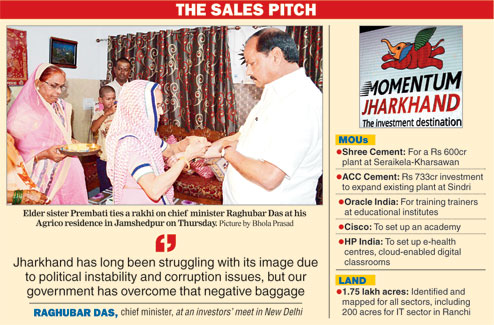
Ranchi, Aug. 18: What would you think if a young state of 16 years, best known as a laboratory of Maoist terror and political instability that has already seen as many as six chief ministers, 10 governments and three stints of president's rule, knocks on your door and invites you for a visit and something more?
No thank you, perhaps?
What if that very state now says it has turned over a new leaf with rebel violence on the verge of being wiped out - in six months, claims its chief minister - and has in place reformist policies on land use, labour and even films, and therefore, you need to take another look?
Err, is that so?
Yes, that's new Jharkhand for you, Bihar's younger sibling that has embarked on a nationwide sales pitch to attract big business. Tomorrow is a road show for prospective investors in Calcutta, coming weeks after similar events in Mumbai, Bangalore, Hyderabad and New Delhi.
"Jharkhand ka marketing karna aur invitation deney par lagey huey hain hum (I am now marketing Jharkhand and giving out invitations)," chief minister Raghubar Das told The Telegraph here last week to explain the rationale behind the all-India exercise of his BJP-led government, which is the first one in the state with a clear majority in the Assembly.
"Jharkhand has mineral wealth. We also have manpower strength that can add value to our natural resources. Through this we want to rein in unemployment... Industrial growth is the key to development. And it is with this in mind that we are planning a global investors' summit next year."
The summit has been scheduled for February 2017.
Das harbours no doubt that safety and security is one of the determining factors that will lead to investments. "Only when an investor is assured that his wealth, derived out of hard work, will stay secure, will he venture into our state. The Naxalite ideology has been defeated. Only a handful of splinter groups that are in the business of collecting levy remain," he said, hastening to add that his government, with the help of security forces, would ensure that the "culture of extortion" was wiped out in six months.
Post Bangalore and Delhi, the buzz seems to be resonating. At least Bollywood has taken note. Actors Naseeruddin Shah and Vidya Balan were in Dumka recently shooting for a Mahesh Bhatt film! And according to chief secretary Rajbala Verma, 27 investment proposals worth Rs 1 lakh crore in mining, IT, education and healthcare were already in the kitty.
Even cardiac surgeon and health entrepreneur-evangelist Devi Shetty spoke glowingly about his pleasant experience in Jharkhand. His Narayana Healthcare, which is already in operation on the outskirts of Jamshedpur, is on the verge of partnering the government to run another hospital in Ranchi.
Former Tata Steel vice-chairman B. Muthuraman, who calls himself a " Jharkhandi" by virtue of his long stay in Jamshedpur, was equally encouraging. "The state lost out on years due to the lack of a single majority government. It now has a very decisive and industry-friendly government very much aligned to the central government. The efforts of the last 20 months are already beginning to show."
Muthuraman was referring to Jharkhand's surprising ascendancy to third place, behind only Gujarat and Andhra Pradesh, in last year's Centre-sponsored ease of business survey, conducted in conjunction with World Bank Group, CII and Ficci.
This is something that the chief minister and his A-team of bureaucrats, including the likes of chief secretary Verma, additional chief secretary and development commissioner (planning & finance) Amit Khare, mines and industry secretary Sunil Kumar Barnwal and chief minister's secretary Sanjay Kumar, never fail to mention while discussing the future of Jharkhand.
The ease of business citation for Jharkhand comes after a series of back-end reform measures that the state undertook over the last two and a half years under the able stewardship of former chief secretary Rajiv Gauba, now secretary in the Union urban development ministry.
The number of government departments were pruned from 43 to 29, rules for small businesses simplified, policies framed in several sectors ranging from food processing to film-making and a single-window system set up for clearances.
Chief minister Das claims the framework is in place. "I want to fulfil the state's needs first. The people of Jharkhand want development. I am looking to create jobs, not just for the educated youths who have to migrate to other states for employment. I also want to create opportunities for those who have been forced to, say, drop out of school. The focus, therefore, is on industry that employs people.
"With huge investments come automation. That necessarily doesn't help us. Malls and hospitals require many people, skilled and unskilled, to run services," the chief minister says, betraying a grassroots approach that perhaps comes from his humble beginnings as a worker in Tata Steel.
Yet Das has a few battles at home he still needs to win. Opposition parties led by JMM and the Congress - he labels them "opportunistic and anti-people" - have seized upon people's disaffection over compensation that is disrupting an NTPC project to develop three coalmines in Hazaribagh district. The other day, after meeting a group of protesting landowners along with Union minister and local MP Jayant Sinha and his father, the BJP veteran Yashwant Sinha, the chief minister promised a fresh relief and rehab package.
Unrest is also brewing over the state government's move to amend certain provisions of age-old land laws to pave the way for commercial use of tribal land. While the state government has promised to incorporate safeguards, tribal leaders, even some within the BJP, don't seem convinced.
The way forward hinges on more dialogue. So far, chief minister Das and his team haven't shied away, which is good for the state that now boasts a flying elephant as its logo to represent Momentum Jharkhand.
Let's see where we land.











